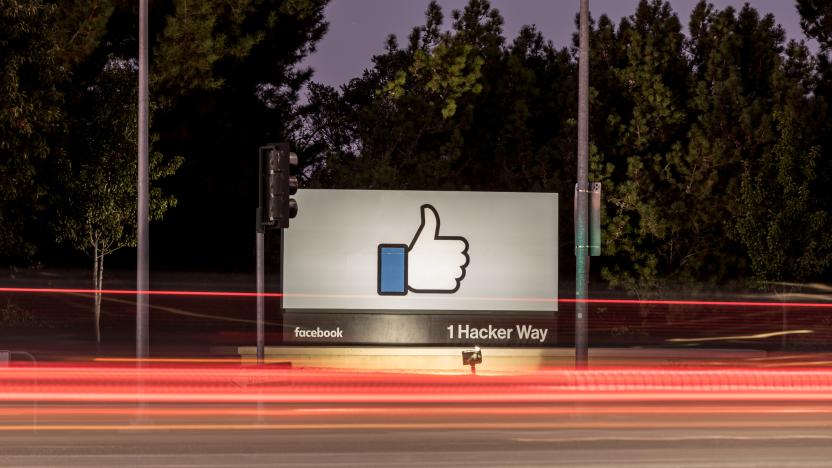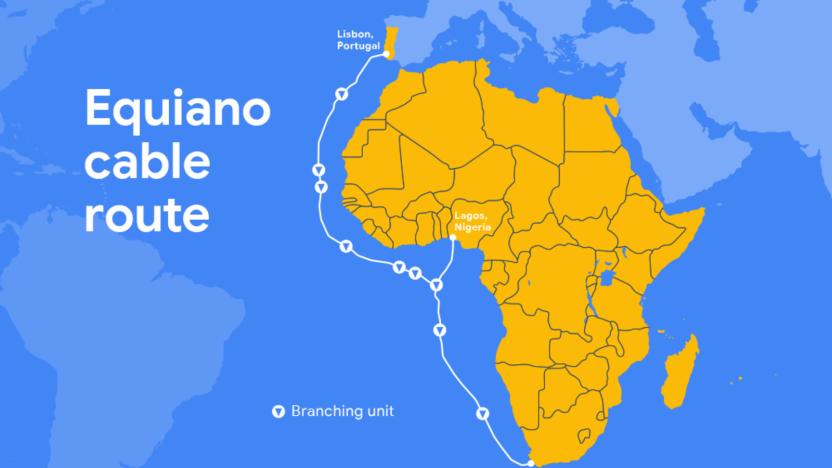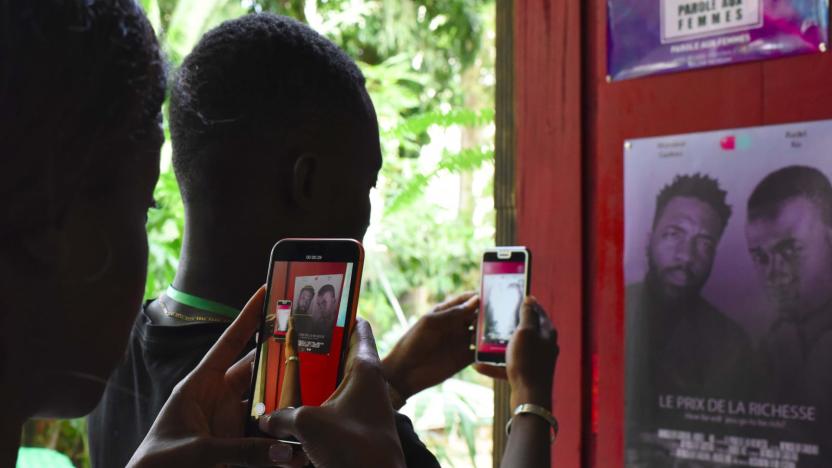undersea cable
Latest

Facebook ordered to clean up undersea drilling equipment in Oregon
Facebook has earned the ire of Oregon residents and officials for abandoning drilling equipment off the state’s coast, 50 feet under the sea floor. The company used all those for Facebook’s undersea fiber optic cable project but had to abandon them after an accident that snapped the drill pipe.

Google’s Curie undersea cable now connects the US and Chile
Curie, a 10,500-kilometer-long undersea cable, now connects Google data centers in the US and Chile. Today, Google announced that the fiber optic cable has been successfully installed and tested. It is expected to begin transmitting data in the second quarter of 2020, and Google is already working on a branch into Panama.

Google's next undersea internet cable will link Africa and Europe
Google has announced its third private undersea internet cable will run between Europe and Africa. One end will make landfall in Portgual. While you might expect the cable would connect to Morocco, it'll run all the way down the African coast to South Africa, with pit stops in other nations.

Facebook wants to circle Africa with an undersea data cable
Facebook's quest to connect more of Africa may have it practically encircling the continent. Wall Street Journal sources maintain that Facebook is in talks to run an undersea data cable (nicknamed Simba -- yes, really) that would run around much of Africa. Details are few and far between, but it might link to existing beach access points in countries along the eastern, northern and western coastlines with the help of telecoms like MTN Group and Vodafone. This would help improve access to Facebook for more of the continent and might just lower the social network's data costs by cutting out in-between companies.

Google, Cuba deal could bring faster internet to the island
Today, Google signed a memorandum with Cuba's telecom monopoly ETECSA to create a cost-free connection between the two networks. Doing so will boost Cuba's internet speeds, but this peering agreement comes with a catch. Cuba will first need to install a new undersea fiber-optic cable to physically connect its network with a Google "point of presence." And that could take years.

Mainland China, Taiwan send first data over direct fiber optic link, take steps towards peace and harmony
Relations between mainland China and Taiwan haven't always been what you'd call warm, even with many companies having a footprint in both regions. Consider the first bursts of network traffic from a newly active connection as olive branches: a pair of undersea fiber optic cables running between southern China's Xiamen and the Taiwan-claimed Kinmen island chain represent the first truly direct data link between the two sides. Built by China Mobile, China Telecom, China Unicom and Taiwan's Chunghwa Telecom, the link both has its share of diplomatic symbolism as well as the very practical advantage of a faster, more reliable route -- there's no globetrotting required to get data and voice to their destinations, and there's fewer chances of blackouts if a boat inadvertently slices a cable. We wouldn't go so far as to call it a Happily Ever After for either faction after decades of tension, but it does at least provide a greater semblance of normalcy to their communication. [Image credit: Aine Hickey, Wikitravel]

Facebook and others invest in 6,214-mile Asia-Pacific undersea internet cable, friend request lag to plummet
It's almost become a truism that internet connections from the Asia-Pacific region to the rest of the world can be slow and lag-ridden, but that assumption is about to be knocked flat if Facebook and others in a Time Dotcom-led consortium have their way. The alliance is investing a combined $450 million into the Asia Pacific Gateway, a 6,214-mile undersea cable that will run between Japan, Malaysia and South Korea. The fiber optic pipe will not only help reduce the need to route large volumes of traffic through Singapore but, in many cases, send much of that traffic straight to American shores -- a big help when Facebook and much of the web industry still hosts most of its content on the Eastern side of the ocean. Although faster speeds won't be in place until the summer of 2014, by which point the more direct connections might be absolutely necessary, it still gives hope to those of us who want to poke friends and upload photos in record time.

New undersea cables planned for arctic passageways, frozen gamers dream of lower pings
Hot on the heels of our own reporting of cables in the South Pacific (or the lack thereof), in flies a report that at least two new undersea cables are being planned for the arctic. According to New Scientist, a pair of lengthy fiber optic wires will be laid through the Northwest Passage above North America, connecting Japan to the United Kingdom. Moreover, a third cable is planned along the Russian coastline, with the longest of these links to purportedly become "the world's longest single stretch of optical fiber." A number of outfits are on the list to help out, and when complete, the latency between Tokyo and London should be reduced between 168ms and 230ms. The cost for such luxury? An estimated $600 million to $1.5 billion for each line. In other words, totally worth it.

New fiber optic cables promise to bring better, cheaper internet access to West Africa
Last summer, the lone undersea cable linking West Africa to the rest of the world was damaged, forcing Nigeria to fall back on slower and expensive satellite connections, and knocking several other countries completely offline until the cable was repaired. While that has been a relatively common occurrence to date, the chances of it happening again in the future are now considerably less likely. That's because a second undersea cable project was just completed this summer, which is the first of two more cables planned, and just the beginning of a new round of investment in the region that the U.N.'s International Telecommunications Union says will vastly increase the bandwidth available by mid-2012. As the AP reports, that additional investment in the region promises to not only increase reliability, but significantly reduce the cost of internet access as well, which currently costs nearly 500 times as much as it does in the U.S. on a wholesale level. Exactly how much cheaper it'll get remains to be seen, however, and there's also still the issue of expanding internet access further inland, where infrastructure remains spread thin and in the hands of only a few companies that tightly control access.

Researchers propose using undersea internet cables to detect tsunamis
We've heard of a few inventive ideas for detecting tsunamis, and it looks like a group of researchers from the National Oceanic and Atmospheric Administration (or NOAA) have now come up with another: put all those undersea internet cables to a second use. While they haven't moved beyond computer models just yet, the group has apparently found that voltmeters attached to the end of an undersea cable are able to detect the small electric field stirred up by tsunamis, which measure around 500 millivolts. As New Scientist reports, however, the idea does have some considerable limitations, including that it wouldn't be able to pinpoint the exact location or direction of a tsunami, and that any such system would first need to filter out noise caused by other natural events and even the cable itself. Other researchers also caution that it's just as important to develop a system to quickly pass on a warning to potentially affected areas once a tsunami has been detected.

Three of four undersea internet cables get cut, hasn't affected you yet
So, there's good news and bad news, and per tradition, we'll be starting with the latter. Three of four undersea cables that route internet traffic from Asia to North America have inexplicably been cut, meaning that your international Quake III server may be a bit slow this evening. The good news is that this fiasco clearly hasn't affected you yet. The AP has confirmed via Egypt's communications ministry that the cables have indeed been severed, causing massive outages in select portions of the world. Oddly, no suspicions of subterfuge have been mentioned, but we have all ideas rumors will start to swirl if another gets snipped. So, tell us readers -- are you still online? Wait, don't answer that.[Via ZDNet]

UAE nabbed a pair of ships suspected for undersea cable cutting
Turns out the United Arab Emirates took two ships into custody on February 19th after those infamous cable cuttings. Wayward anchors are suspected to be at fault, and the Korean company responsible for one of the vessels just agreed to fork over 60 grand in damages in exchange for the release of its ship. The other ship, which is owned by an Iraqi company, is still under Dubai custody, and the two sailors on board were arrested and are awaiting prosecution next week. As for us, we're standing by our space aliens in league with garden gnomes theory. It all just adds up. [Thanks, Mike]

Cut four undersea cables, shame on you, cut a fifth, also shame on you
If you're reading Engadget today because your favorite Iranian gadget blog is offline, here's why: a fifth undersea cable has now been reported as cut (or at least damaged), responsible for knocking Iran and a few other million people mostly off the interwebs. Things were already looking awfully suspicious when a fourth undersea cable in the Mediterranean was cut yesterday, and while nothing about a fifth cable being cut necessarily means some sort of sabotage is to blame, it's not exactly reassuring. Emergency measures are already underway to repair the cables, but we're not sure our inter-continental Quake III Arena deathmatch can handle any more snips. [Via Slashdot; image courtesy of I Love Bonnie]Update: Just to be clear, early reports of the entirety of Iran being offline turned out to be exaggerated or perhaps entirely false.

Fourth undersea cable cut near UAE, suspicions rise
For the fourth time in a week, an undersea communications cable has apparently been cut (or "failed due to a power outage," as some sources suggest), and while no official reports of subversion have surfaced just yet, things are beginning to get suspicious. Flag Telecom, a subsidiary of Indian conglomerate Reliance ADA Group, has had two cables damaged in the span of a week -- a quandary it has never dealt with until now. As it stands, traffic from the Middle East and surrounding areas is being routed through various other cables in an attempt to remain online, but any more snips and we could be dealing with ping times eerily similar to those seen in 1993 (or much, much larger issues).[Image courtesy of DivingCo]






